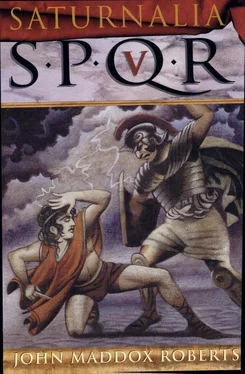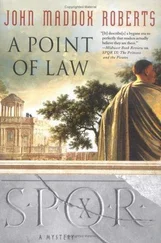John Roberts - Saturnalia
Здесь есть возможность читать онлайн «John Roberts - Saturnalia» весь текст электронной книги совершенно бесплатно (целиком полную версию без сокращений). В некоторых случаях можно слушать аудио, скачать через торрент в формате fb2 и присутствует краткое содержание. Год выпуска: 0101, ISBN: 0101, Издательство: St. Martin, Жанр: Исторический детектив, на английском языке. Описание произведения, (предисловие) а так же отзывы посетителей доступны на портале библиотеки ЛибКат.
- Название:Saturnalia
- Автор:
- Издательство:St. Martin
- Жанр:
- Год:0101
- ISBN:9780312320188
- Рейтинг книги:4 / 5. Голосов: 1
-
Избранное:Добавить в избранное
- Отзывы:
-
Ваша оценка:
- 80
- 1
- 2
- 3
- 4
- 5
Saturnalia: краткое содержание, описание и аннотация
Предлагаем к чтению аннотацию, описание, краткое содержание или предисловие (зависит от того, что написал сам автор книги «Saturnalia»). Если вы не нашли необходимую информацию о книге — напишите в комментариях, мы постараемся отыскать её.
Saturnalia — читать онлайн бесплатно полную книгу (весь текст) целиком
Ниже представлен текст книги, разбитый по страницам. Система сохранения места последней прочитанной страницы, позволяет с удобством читать онлайн бесплатно книгу «Saturnalia», без необходимости каждый раз заново искать на чём Вы остановились. Поставьте закладку, и сможете в любой момент перейти на страницу, на которой закончили чтение.
Интервал:
Закладка:
I still had a few hours before going to Celer’s house. Clodia, I recalled, liked to start dinner late. This was regarded as scandalous, which was probably why she did it. That gave me time to make another essential call.
Milo’s house, or rather fort, was located in a tenement warren that made it difficult to attack directly. He had planned it that way. He had once told me that a house fronting on a public square is imposing, but it gives your enemies plenty of space to run and build up momentum with a battering ram. It was because of such foresight that Milo had risen to the prestige and dignity of Rome’s most prominent gangster. Always with the possible exception of Clodius.
At that time Milo was allied with Cicero. As Cicero’s star was descending, Milo’s preeminence was likewise fading. It was one of the many ironies of the political and social scene that the aristocrats were championed by Cicero, a novus homo from Arpinum, whose favored gang leader was Milo, a nobody from nowhere, while the representatives of the common people were Caesar and Clodius, both of them patricians from incredibly ancient and prestigious families.
The guard at the gate was, as usual, Berbix. He was an ex-gladiator of Gallic origin, who was well known in Roman courts. He had uncommonly good eyesight, making him especially apt for spotting Clodius supporters at a distance and concealed weapons closer up.
“Welcome back, Senator,” he said, favoring me with a gap-toothed grin. I was beginning to wish people could find something more original to say.
“Is Milo in?” I asked.
“He always is, except when he’s in the Forum,” Berbix answered. “His door’s always open to any who want to see him. Go on in.” He ignored the dagger beneath my tunic. I was one of the few men who were allowed into Milo’s presence armed. Not that anyone, with or without weapons, presented much threat to Titus Annius Milo Papianus.
This accessibility of his was part calculated political wisdom and partly the fact that he wanted people to think of him as a tribune. By ancient custom, the doors of the Tribunes of the People were to be open at all times. Milo felt that political power grew from close contact with the citizens, not hobnobbing with senators. He was always ready to do people favors. Then, of course, they were expected to do favors for him.
I found him sitting at a small table with another man, a hard-faced character in a senator’s tunic who looked somewhat familiar. The two of them were going over scrolls that seemed to contain lists of names. Milo looked up at my approach and a huge grin spread over his face.
“Decius!” He sprang to his feet and enveloped my comparatively diminutive hand in his huge paw, the palm of which felt as if it were covered with articulated metal plates. He had been a galley rower in his youth, and he had never lost the horny hands of that profession.
“I hear you’re prospering, Titus,” I said.
“So I am,” he said, self-satisfaction enveloping him like a toga. In another man it might have been a repellant attitude, but Milo accepted the largesse of Fortuna the way a god accepts worship. He looked like a god, too, which never hurt him with the voters. He turned and gestured toward his companion. “I believe you know Publius Sestius?”
Now I remembered. “Of course. We were both quaestors when Cicero and Antonius Hibrida were consuls.” It was coming back to me and I held out my hand, which Sestius took. “We never saw much of each other. I remember that you were returned first at the polls and got attached to the consuls’ personal staff. I was in the treasury.”
“It was a memorable year,” Sestius said, which was a diplomatic way to put it. He had the look of an aristocrat who was also a street brawler. The same, I suppose, might have been said of me.
Milo clapped his hands and a thug brought in a tray with a pitcher of wine and cups, along with the usual nuts, dried figs, dates, parched peas, and so forth. Despite his wealth, Milo had no comely serving girls, cultured valets, or entertainers among his staff. Every member of the household was eminently capable of defending the house and their master.
“Publius and I are working out our strategy for next year’s tribunician elections,” Milo said. “We’ll probably spend most of our time in office undoing all the harm Clodius will do next year. Clodius will get Cicero exiled, so we’ll get him recalled. That’s going to take some hard work.”
“I’ve just had an odd encounter with Clodius,” I said, glancing significantly at Sestius.
“And you’re still alive? Speak freely, Publius is no friend of Clodius.”
Briefly, I sketched out my odd interview with Clodius. Milo listened with his customary intense attention. No nuance of anything he heard ever escaped Milo. At the end of it, he tossed a handful of salted peas into his mouth.
“I fear you are not going to make Clodius a happy man. That harpy poisoned Celer as sure as the sun comes up every morning.”
“Why?” I asked. “She’s malevolent and she despised her husband; but she had to be married to somebody, and Celer wasn’t as objectionable as most she would have been attached to. He had a fine house, and he left her free to do pretty much as she pleased.” This constituted a happy marriage, among my class.
“Celer got a bit too hostile toward her little brother toward the end,” Milo said.
“That’s right,” Sestius concurred. “Decius, you’ve been away from Rome too much of late. Last year Metellus Celer, as consul, opposed Clodius’s bid to transfer to the plebs. He was certainly not alone in that, but he got downright violent about it. He was losing his sense of moderation in his last months in office.”
“It was a busy year,” I observed. “I heard that Caesar and Pompey and Crassus made up their political differences.”
“Temporarily,” Milo said. “It won’t last. But for now the usual feuds are dormant. Caesar got Clodius transferred to the plebs to clear his path to the tribuneship, got him adopted by a man named Fonteius to do it, and guess who presided as augur at the adoption?”
I ran the list of augurs through my memory, trying to recall which of them were still alive and in Italy. “Not Pompey!”
“Pompeius Magnus himself,” Milo confirmed.
“The world is getting to be a very odd place,” Sestius said. “If you can’t count on people like that to slit one another’s throats, what can you count on?”
“Things will be back to normal soon,” Milo said. “Clodius is going to make such a mess of things next year that people will demand a return of order.”
I had my doubts. “Clodius is ridiculously popular,” I said. “Is it true that he plans to make the free distribution of grain a guaranteed right of the citizens?”
“A radical concept, isn’t it?” Sestius said.
“It won him his tribuneship as nothing else could,” Milo commented, picking up a few nuts. “I wish I’d thought of it first.”
“You’re joking!” Sestius said. “If the grain dole becomes institutionalized; instead of an emergency measure, not only will we lose one of our most powerful political tools, but every freed slave, ruined peasant, and footloose barbarian in Italy will head straight for Rome to sign up!”
“They already do that anyway,” I pointed out.
“It’s no cause for rejoicing,” Sestius grumbled.
“We’ll sort things out,” Milo said confidently.
It may seem odd that men like Clodius and Milo and Sestius could speak with such sanguine assurance, as if they were about to reign as kings rather than serve as elected officials, but the tribuneship had made a great comeback in the last few years. Sulla had all but stripped the Tribunes of the People of all their powers, but one after the other, each year’s tribunes had passed laws in the Popular Assemblies restoring them. Now they were more important than ever, and they had the immeasurable power to introduce new legislation and carry it through the assemblies. This was the power that gave or withheld proconsular appointments, apportioned the state’s treasure, and got people exiled. The consuls themselves were relatively powerless by comparison, and the Senate had become a debating club. Real power lay with the commons and their elected representatives, the tribunes.
Читать дальшеИнтервал:
Закладка:
Похожие книги на «Saturnalia»
Представляем Вашему вниманию похожие книги на «Saturnalia» списком для выбора. Мы отобрали схожую по названию и смыслу литературу в надежде предоставить читателям больше вариантов отыскать новые, интересные, ещё непрочитанные произведения.
Обсуждение, отзывы о книге «Saturnalia» и просто собственные мнения читателей. Оставьте ваши комментарии, напишите, что Вы думаете о произведении, его смысле или главных героях. Укажите что конкретно понравилось, а что нет, и почему Вы так считаете.









